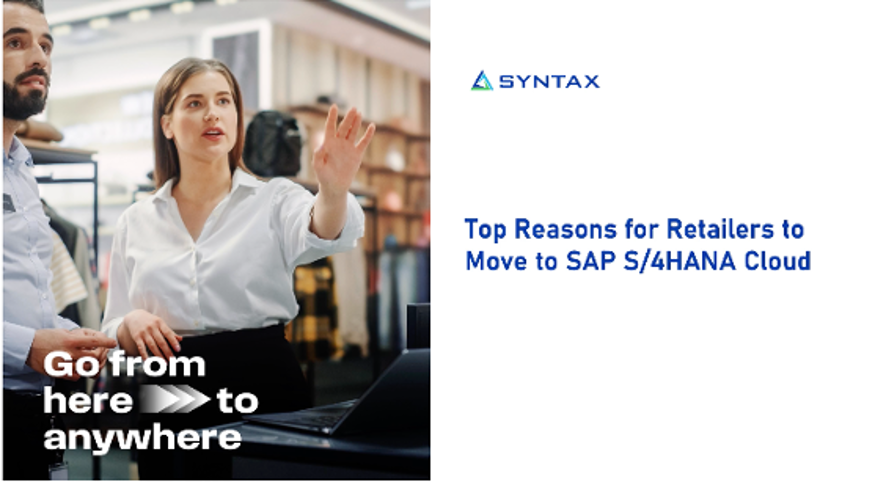The retail industry is experiencing a radical shift, driven by technology’s ability to transform operations, elevate customer experiences, and help businesses outperform the competition. From warehouses to inventory management, supply chains to online retail, technology is the key to unlocking productivity, agility, and innovation.
Advanced technologies powered by AI in retail are leveraging millions of data points to help businesses make smarter decisions, minimize inefficiencies, and adapt proactively to shifts in demand or logistic challenges.
Let’s explore how retail ERP solutions like SAP Cloud ERP have evolved—and how businesses can benefit to stay ahead in a fast-changing marketplace.
1. Warehouse Transformation: Optimizing Automation and Efficiency
Warehouses are the backbone of retail operations, but manual processes and inefficiencies can hold businesses back. Technology is revolutionizing warehouse management with automation, AI-driven insights, and real-time connectivity. Some of those warehouse technological transformations are:
- Automation: Automated systems, robotics, and AI in retail can optimize picking paths, streamline inventory placement, and reduce errors. SAP Cloud ERP with EWM (Extended Warehouse Management), for example, directly connects to robotics and conveyor systems, eliminating middleware and improving speed.
- Real-Time Integration: Retailers are now able to monitor warehouse operations in real-time, ensuring seamless transitions from receiving to delivery. This visibility allows for quicker responses to disruptions and improved inventory accuracy.
- Scalability: Modern warehouse solutions enable businesses to scale operations all within the same facility. Previously, if you wanted to move large full pallets to your bulk customers out of a warehouse or move smaller quantities to customers with lower demand, for example online orders —all out of the same big warehouse facility—it wasn’t easy to enable this quickly. Now it is.
By adopting these innovations through a robust retail ERP, retailers can transform their warehouses into hubs of efficiency, ready to adapt to fluctuating demand.
2. Supply Chain Modernization: Enhancing Agility and Collaboration
Supply chain disruptions have become a fact of life for retailers, with external pressures like shipping delays and rising costs. Technology enables businesses to modernize and build more agile, resilient supply chains achieving:
- End-to-End Visibility: Access to real-time data from the same platform across the supply chain ensures businesses can track goods, forecast demand, and prevent bottlenecks. More importantly, it helps customers get the products they want, when they want them.
- Vendor Collaboration: Tools like SAP Logistics Business Network allow retailers to work more closely with suppliers to pre-label, pack, and prepare shipments, reducing delays and manual processes.
- AI Optimization: Using AI in retail can optimize transport routes, forecast inventory needs, and automate customer support, ensuring quicker responses and smoother logistics. For example, through SAP Cloud ERP with SAP TM (Transportation Management), retailers can book truck slots and track delivery schedules, ensuring smooth transitions. This type of integration minimizes delays and increases supply chain agility.
Retailers that prioritize supply chain modernization with a best practice retail ERP are better equipped to handle disruptions, deliver on customer promises, and minimize costs.
3. Streamlined Inventory Management: Real-Time and Data-Driven
Effective inventory management is crucial for avoiding stockouts, delays, and excess inventory—all of which can impact customer satisfaction and profitability. Some examples below:
- Real-Time Data: Retailers can now capture every POS transaction, shop-floor stock update, and quality check in real-time, ensuring accurate inventory levels.
- Automation: Automated inventory processes eliminate human errors and ensure that the right products are available at the right time.
- Customer Communication: When delays or stockouts occur, technology enables accurate and transparent communication with customers, helping to maintain trust.
Efficient inventory management not only reduces costs but also ensures customers can depend on retailers to deliver the products they need, when they need them.
4. Online Retail: Seamless Experiences and Reverse Logistics
As online shopping continues to grow, retailers must deliver seamless experiences that cater to evolving customer expectations. Consumers want fast delivery, clear order tracking, and hassle-free returns—all of which require robust technology solutions.
- E-commerce Integration: Retailers must connect their online and in-store operations to offer consistent pricing, product availability, and good customer experiences across all channels.
- Returns and Reverse Logistics: Customers value easy returns as much as fast purchases. For instance, SAP Cloud ERP with SAP EWM provides advanced reverse logistics solutions, helping retailers process returns efficiently and maintain customer trust. This not only enhances customer satisfaction but also reduces long-term costs associated with poor return processes.
- Personalization: AI-driven analytics allow businesses to personalize the online shopping experience, offering tailored recommendations and promotions that drive sales and loyalty.
Retailers that embrace retail ERP technology and streamline their e-commerce operations will be better positioned to win over customers and grow their market share in this competitive space.
The Path to Retail Transformation
From warehouse automation to supply chain agility, inventory accuracy to seamless online experiences, technology is the driving force behind retail transformation, particularly when using AI in retail. By adopting modern solutions like SAP Cloud ERP with help from a trusted partner like Syntax, retailers can simplify processes, reduce costs, and focus on delivering exceptional value to their customers.
How to Get Started
SAP Cloud ERP for retail delivers an end-to-end, integrated suite that helps retailers manage everything from merchandise management, AI-powered personalization, omnichannel commerce, warehouse automation, and supply chain optimization to enhance retail operations.
On-demand Webinar: Top Reasons for Retailers to Move to SAP S/4HANA Cloud
Syntax is your trusted partner to help you implement and manage the retail ERP technologies to transform operations, elevate customer experiences, and outperform the competition. We have more than 20 years of proven retail experience.
The future of retail belongs to businesses that embrace innovation, adapt quickly, and prioritize customer satisfaction. Are you ready to transform your operations and outsmart the competition?
Author

Peter Kerr
Senior Director: Supply Chain Solutions, Syntax
Peter Kerr, the Co-Founder and Director of Argon Supply Chain Solutions, a Syntax company, is a 20+ year veteran in logistics and transport planning. Before founding Argon Supply Chain Solutions, Peter worked at many other prominent companies in South Africa. He is an SAP Certified Associate and Application Professional specializing in SAP solutions. He also has a strong understanding of data collection technologies and supply chain solution architecture.



